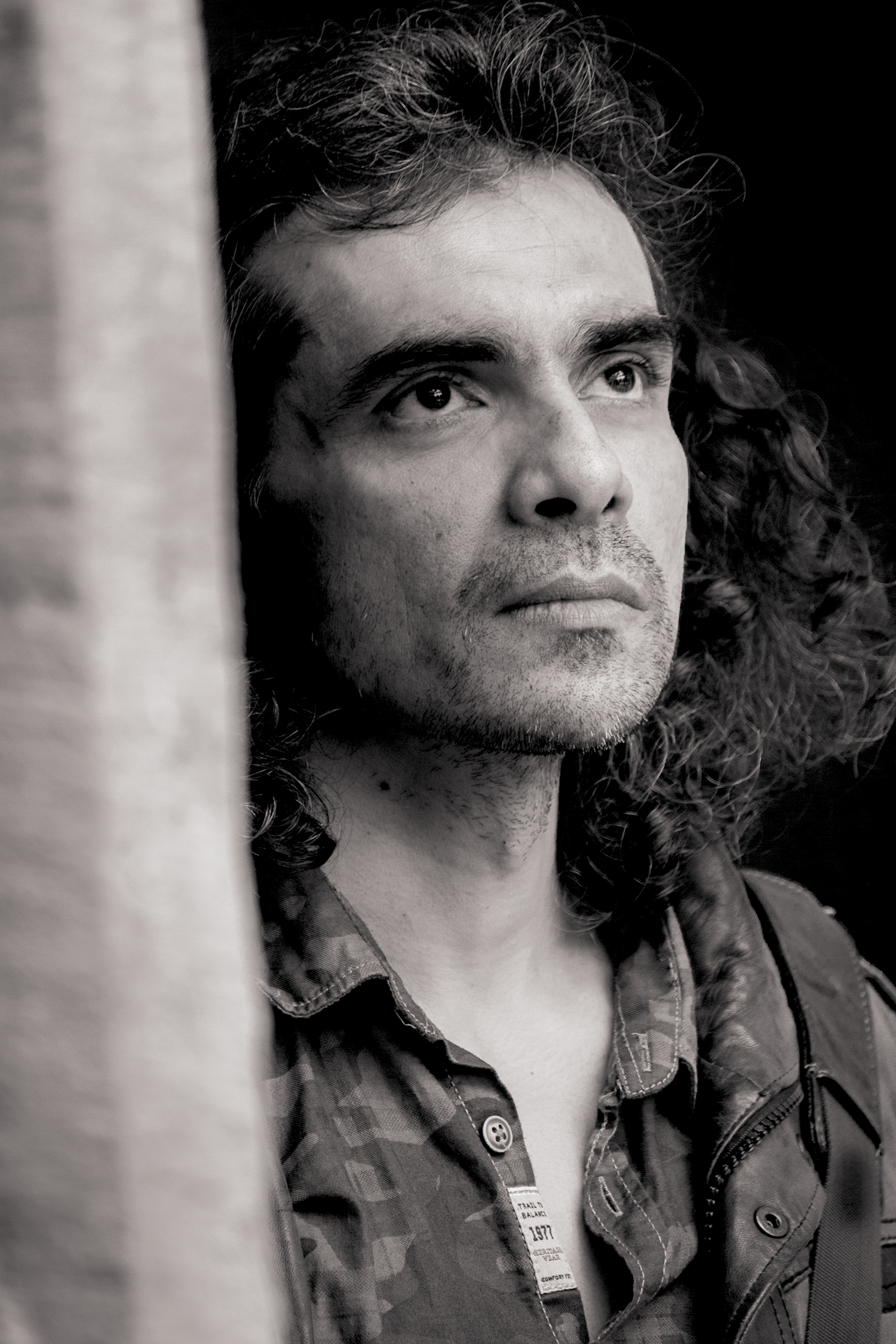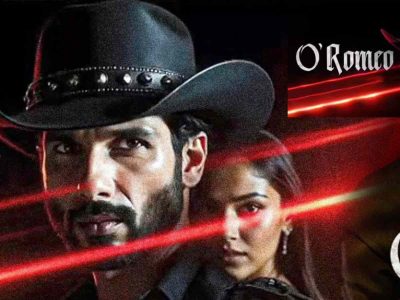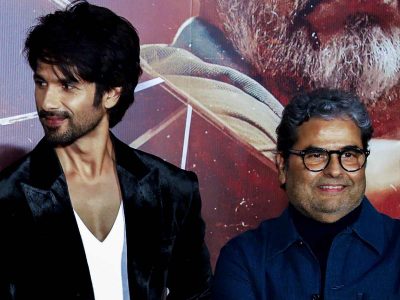Filmmaker Imtiaz Ali talks about his childhood days, sleeping at a local train station during college and the influences on his filmmaking
He is the flag-bearer of romantic films of this generation in Bollywood. With a career spanning over a decade, acclaimed filmmaker Imtiaz Ali has delivered massive hits, worked with superstars and has a huge fan base.
I first had a chance of interacting with him a few years back when he was at the Jaipur Literature Festival. I was at the media gallery, where he came to give some interviews. I did a small photoshoot. Next I met him in 2018 at IGNCA, Delhi’s green environment where he sat and interacted with youngsters, almost becoming a part of them — and it was amazing for me to see a star conversing with his fans with undivided attention and zero tantrums.
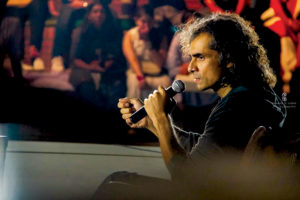
In fact, during my latest interaction with him, at the most beautiful Sunder Nursery where he was attending the Kathakar festival, he ordered his bouncers not to stop people from coming to him, saying, “No one is going to hurt me, let them come…!” Earlier, when he sat amidst hundreds of people in the audience to tell a story, he looked comfortable while the fans were awestruck and kept looking at him in wonder — listening to the impromptu story that he was cooking and serving simultaneously. My desire to have a conversation with him had by now become stronger than ever. He said we can have a 5-10 minute talk, but I needed no less than 90 minutes.
Time passed and he was to come to Delhi again. It was decided that I’d meet him at the Meridian, where he’d reach from the airport at around 1:30 am. I asked him, both of us being in love with Hazrat Nizamuddin Aulia, would you like to first go to Aulia’s place?
Despite the ugliest of Delhi smog, the atmosphere at the shrine was divine. A devotee or two were praying and a couple of them were sleeping, the cool of early November air in the Pir’s courtyard was making us all feel blessed. At the hotel, Imtiaz, who must’ve been tired, showed no signs of it. I made some tea for us and then our conversation started :
Who is your guru?
No one in particular. Overall, it’s the blend of everything..
Let me modify it to ‘who has been the guiding factor?’
It has been an accumulation of many people, forces and characters that are real as well as imaginative, some of who existed in stories, or from any film.
Also, my parents and many of my teachers, my basketball coach and theatre directors.
Basketball coach – how? That’s interesting.
In my Jamshedpur school, I was so dedicated to basketball that it was the most important thing in my life, as if, I’d be playing it all my life. But then a future in basketball wasn’t very secure so it was decided that I’ll do engineering.
And the Basketball coach?
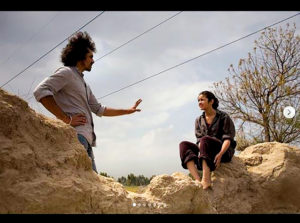
We had Mr Sachinder Singh as our school’s basketball coach. I being a very active student had a good rapport with him. He would teach me skills. I was active in academics and also theatres which I started in the 9th standard. While at the court I’d be asked, “what were you doing in the theatre auditorium for so long?”…and at the theatre auditorium it was difficult to explain why am I there in my basketball attire, all drenched in sweat.
What about Gurus in the theatre ?
My first serious director, about whom I’d like to tell, was Mr Barun Roy. He was the first to direct me into a play: I was acting Arthur Birling in J B Priestley’s ‘An Inspector Calls’. This is the first time that I was getting some serious and professional advice. Barun sir taught me how to act in a play, how to enunciate and he trained me tremendously. Some of his teachings I still follow, like how he dealt with his actors.
Whose writing was it that first made you want to write?
I feel I was inclined towards poetry since the beginning. In our textbook, there were poems of Kipling, Keats, Wordsworth and there was ‘Highwayman’ of Alfred Noyes.
This is class 10?
It was during 9th and 10th.
You still remember all these poets from your book!
Yes! I enjoyed them a lot. And when I started writing: it was poetry that I wrote first.
So, any particular poet who influenced you to write?
No one in particular. All of these poets did. I enjoyed poetic thoughts: the way poets express certain things — which is beyond the power of normal verse writing. They are more free, much more ethereal: matlab ek upar ke level ki baat karte the (they spoke at a very high level).
There is a very important incident that happened in my life. My father would encourage me, as a child, to travel solo. I’d travel a lot including overnight journeys and during one such journey, I bought a Bhagwad Gita from the AH Wheeler. It was a paperback version that I could get on very concessional rates. The train moved and I started reading it. I was a very young reader at that time and was amazed, as if I have hit a wisdom-jackpot, reading, finding, realising and understanding things that were totally new to me, opening my heart. I continued reading it page after page and later it became a habit to read a page or two, to sleep as it would give me a soothing comfort. Gita changed my life. Even now it is there in my house, and I keep going back to it. A book that I thought is philosophical turned out to be a page-turner…life-turner!
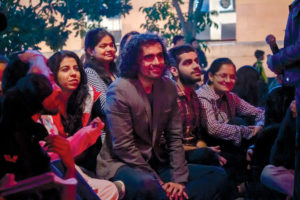
Secondly , when I was in 6th standard, during the month of May-June, the peak-summers, we were not allowed to go out during the sunny hours. So here I am in that room in our house that had books of Shakespeare, to give me company. Now Shakespeare’s work are , though not easy to read as it is in old-style English, but it’s easy to understand once you start reading it. When I, as a kid, started enjoying the dramatic-poetic style of Shakespeare, the influence was destined.
I grew up listening to Ghalib and Amir Khusrow, as people of my nanihal (mother’s parents’ side) had always had some cassettes of them singing in the voices of Mehdi Hasan, Ahmed Hussain Mohammed Hussain, Talat Aziz or Ghulam Ali and of course Begum Akhtar. From even the time when I liked listening to Kishore and won’t listen to ghazals thinking why are they repeating the same lines again and again, I found Amir Khusrow interesting and would like Shankar Sambhu, Ghulam Farid Sabri when their voice filled our house. All this got into me unconsciously and stayed.
Then in Hindu college days, my subject English literature introduced me to the Elizabethan, romantic era and so on…the journey continued and after many discoveries, it was time to go back to the basics and I started reading Faiz, whose poetry to me was most contemporary. I get connected to his words with the feeling that he is talking about our times, that it is being written now: Bol ke lab Azaad Hain Tere (Speak as your lips are free), aaj bazar mein pa-ba-jaulan chalo (going to the market today, bound in fetters). Faiz is that person in my life by reading whose work I get peace, comfort and strength — that I think is his biggest contribution also: to give strength.
When did you start writing?
I started writing early, in the 9th standard. I wrote poetry on our surroundings.
Can we have some of them?
It’s difficult now.
Will you try locating them?
Let’s see.
How movies became an important part of your life?
Actually, all these things happened simultaneously.
Though my parents were movie-goers they didn’t encourage us watching them and would sometimes take us along. Our relatives there, in Jamshedpur, had movie theatres. So, as a young boy, I would go there, without telling anyone. The staff would not stop me and standing at the doors, I would watch for as long as I wished to. These are my happiest memories, as those were the times that I enjoyed the most. These memories are not about one movie, but what consisted of my world of cinema at that time.
Which movie first stuck your attention when as a boy you began frequenting the theatres?
Qayamat Se Qayamat Tak. Also, Ghulami had a huge impact on me as it had in it a new world; and that world was represented very beautifully. A new geography: the desert, flying sand grains, colorful dresses of women, the dialogues, music — all in Rajasthani style. The human drama was depicted very beautifully, I used to enjoy the whole culture of Ghulami. Reshma’s voice. I loved Hero also, must’ve seen it 20-25 times.
Jamshedpur is culturally very diverse so we had movies of different languages too. I saw Mani Ratnam’s Telugu movie Geetanjali numerous times, also Shyam Benegal’s Junoon.
Which international film is your first choice?
I like a lot of international cinema. In fact, more than the American films, which I watched a lot while growing up, it was films by Emir Kusturica, a Serbian filmmaker; Wong Kar-wai, a Chinese filmmaker, Majid Majidi an Iranian filmmaker; Pedro Almodóvar, a Spanish filmmaker – all of whose works I adore.
What was the influence of these filmmakers and their movies?
The Europian films presented me with a certain way of storytelling but I don’t watch them to learn film making. I watch them as an audience, to enjoy and I don’t know if they have influenced my movie making, subconsciously.
Subconsciously, of course!
Yes, they have influenced me to think in a particular way…
Please tell me about your mother.
My mother is the most intelligent person that I know. She is very very sharp. It is her interest in people, from which I think I’ve learned the fine art of people watching. She always chooses that seat in the restaurant from where she can see the maximum number of people from, and I try to do the same, so when we are together in a restaurant there is a competition between us for that seat.
Any memory of that time?
I was always very shy and introverted. Even now if I have to walk a red carpet, I feel nervous, I’ll go late so that I can quickly rush past, so that I don’t have to say anything. It is strange that even though I have acted on stage for so long, but still.
As a child, initially, I was not good in anything from studies to sports. But in 9th standard there was a certain renaissance, and I became good in everything.
Bhagwad Gita played a role?
It did, I had been reading it for a while. What happened during the 9th standard was that I failed, and I had to repeat the class. That changed my life.
Reaction of parents?
They were always very understanding. When they knew that I was already suffering they didn’t make me suffer more, instead they tried making it easier for me.
I think my father dealt with my rebellious phase extremely well. There’s a time when a son competes with his father. I would subconsciously challenge him. He took that very well. He did not crush me. He actually made me flower, made me confident. Over a period of time, he turned me into a very reasonable person: somebody who, like a sportsman, can compete without anguish or hatred. The most important thing in my life has been that how my parents dealt with me.
This, how your father dealt with you, can be a very good lesson for a lot of us out there, may you elaborate on this a bit?
I am a father of an 18-year-old daughter who has gone to University. When my daughter was growing up, that was the time when I realised the value of ‘how my father treated me’. There were times when my father had a choice of either letting me flourish or him winning a fight. He would choose me over himself. I feel that a man when he is older should have the confidence to see his child’s interest before his own. It’s only when a person starts doing that that he can become a nurturer, or a parent, or a leader. By the very definition I feel that a leader is a person who empowers other people rather than empowering himself.
And your mother?
My mother has always been very beautiful.
Is that where you get your looks from?
[Chuckles] That I don’t know but she, in her circle, is very famous for being very beautiful. As a kid, I had always known that, and for a boy it is not always a very good thing. You know [chuckles] sometimes you feel a little odd about it.
And you and your daughter.
I am very blessed, for the daughter that I have is a much better daughter than I deserved to have. She is, perhaps, my best friend, always guiding me. I, of course guide her in the way that I can but she is also telling me about whatever I do: films, clothes that I wear, language that I use [chuckles] you know the Whatsapp language.
Children have a lot of purity and my daughter always offers her own pure reaction to me. Though she is in the US now, but we keep bouncing off things to each other on Whatsapp.
What is your idea of women?
For me women are superior to men in intellect, they are also more subjugated. Uptil now, they have had to suffer more than men. They are more vulnerable in society than men are and this vulnerability makes them stronger and smarter, they are also more practical. I am very easily attracted to women. I find them very attractive people – now I’m old enough to admit that, earlier I was too shy to say that but now its fine, [chuckles] it’s a good thing, nothing wrong in that.
Women are inspiring. The figure of inspiration is always female. When Homer used to write his stories, he would always invoke the muse, who was a lady figure, a feminine figure. The earliest figurines of worship have been feminine figures. Most rivers in the world, especially of India are female. You say mother nature, not father nature! The source of life is almost always feminine. And mother doesn’t necessarily mean “mother”, it means anything that gives you energy and sustenance. When we say ‘God’, unfortunately we feel that it could be a masculine force but its not necessarily gender oriented.
It’s a recent development.
Yes some 100 years. All the tribal cultures are still female-centric – matriarchal!
Your friends from your schooldays?
The Whatsapp group that is most active on my phone is the school friends’ group. And since I am a pure science student and I’m the only one who came away and did English Literature while all the others are still engineers and they are all techies. Almost all of them are in America and doing different things now. I’m the only one who got away. Again, Jamshedpur is a cosmopolitan town. So an equal number of all communities of India are present in Jamshedpur and my friend group also comprises of South Indians and North Indians and Punjabis and Sikhs and people from Uttar Pradesh and Bihar and Bengal. There is a certain language in Jamshedpur which is a little strange, it’s Hindi but it has a lot of Bengali words and South Indian words and there is no gender in conversation, like Bangla doesn’t have gender.
We meet quite often, at least two to three times a year, gathering at my place, or their places. We take trips outside. Recently I was in Cuba with my school friends. There’s no agenda, we keep doing it : life is short and the only requirement we have is a room where we all can sit and talk — no matter how exotic the place it is that we are visiting.
College friends?
All busy with their life, some are into media, some are IAS. You learn various things together: all the ‘badmashiyan’, all the fights, the vulnerability, [chuckles] whose girlfriend is coming and for that, which room is to be vacated. All these planning we used to do together.
What was that story about your sleeping at Victoria Terminal (now CST)?
Our term at the hostel ended, hence we had to move out from it so we rented a house to live in. Now, had we been a bit responsible to not party (laughs) but plan our accommodation, it wouldn’t have happened. So it happened once or twice that a few of us had to spend our nights at VT.
The writer is an interior designer with a passion for photography and Hindustani literature and culture
To be continued….

